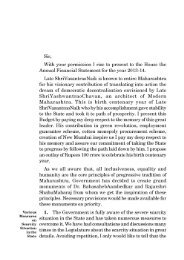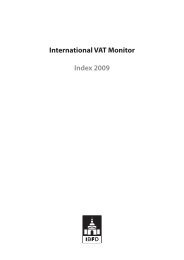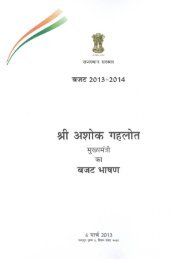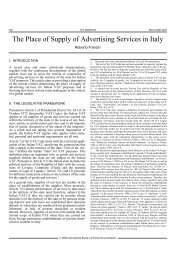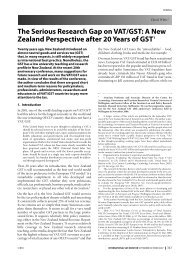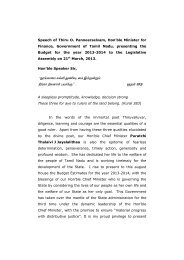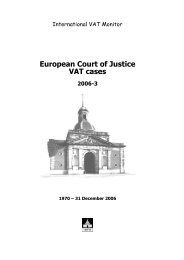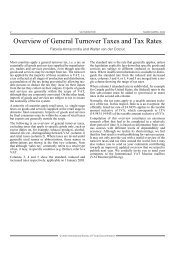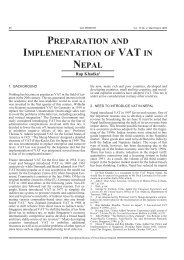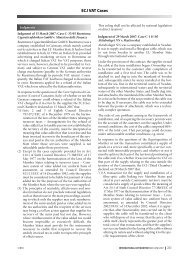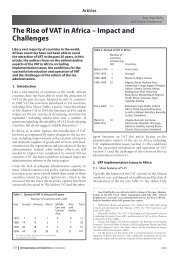The New EU Place-of-Supply Rules from a ... - empcom.gov.in
The New EU Place-of-Supply Rules from a ... - empcom.gov.in
The New EU Place-of-Supply Rules from a ... - empcom.gov.in
You also want an ePaper? Increase the reach of your titles
YUMPU automatically turns print PDFs into web optimized ePapers that Google loves.
Articles<br />
that provision has the effect that, where neither the service<br />
provider nor the customer is established <strong>in</strong> the Member<br />
State where the supply is made, the customer must<br />
register there <strong>in</strong> order to account for VAT on the value <strong>of</strong><br />
the received services, even if the customer is established<br />
outside the European Union.<br />
Example<br />
A transport company established <strong>in</strong> the United States transports<br />
goods <strong>from</strong> one Member State to another on behalf <strong>of</strong> another<br />
company established <strong>in</strong> the United States. <strong>The</strong> Member States<br />
<strong>in</strong>volved <strong>in</strong> the transport service apply the effective-use-andenjoyment<br />
criterion to the effect that the service is effectively<br />
used and enjoyed at the place where the transport actually takes<br />
place.<br />
Under the general system <strong>of</strong> VAT (Art. 193), the US transport<br />
company would be liable for VAT and thus would have to register<br />
for VAT purposes <strong>in</strong> the Member State(s) where the transport<br />
actually takes place. However, under the new Art. 196, the US<br />
customer could also be held liable and therefore obliged to register<br />
for VAT purposes <strong>in</strong> those Member State(s) and account for<br />
VAT under the reverse charge mechanism on the value <strong>of</strong> the<br />
received transport service.<br />
In view <strong>of</strong> the seventh recital <strong>of</strong> the preamble to Directive<br />
2008/8, the new Art. 19 should only apply if the<br />
recipient <strong>of</strong> the services is established <strong>in</strong> the Member<br />
State where the services are deemed to be supplied. That<br />
recital states that the reverse charge mechanism is obligatory<br />
“where a taxable person receives services <strong>from</strong> a<br />
person not established <strong>in</strong> the same Member State”. <strong>The</strong><br />
words “<strong>in</strong> the same Member State” clearly refer to the<br />
Member State where the recipient <strong>of</strong> the service is established.<br />
Under teleological <strong>in</strong>terpretation, the new Art.<br />
19 should not apply to services that are deemed to be<br />
supplied <strong>in</strong> a Member State where the customer is not<br />
established. <strong>The</strong> reverse charge mechanism is a simplification<br />
measure aimed at prevent<strong>in</strong>g the situation that the<br />
service provider must register <strong>in</strong> the Member State <strong>of</strong> the<br />
supply. It would be contrary to the nature <strong>of</strong> the simplification<br />
measure if, <strong>in</strong>stead <strong>of</strong> the non-resident service<br />
provider, the non-resident customer would be required<br />
to register <strong>in</strong> another Member State.<br />
5.2. Fixed establishments<br />
<strong>The</strong> new Art. 192a provides that, for the purposes <strong>of</strong> the<br />
liability to remit the tax to the authorities, a taxable person<br />
who has a fixed establishment with<strong>in</strong> the territory <strong>of</strong><br />
the Member State where the tax is due is to be regarded<br />
as not be<strong>in</strong>g established there, if:<br />
(a) he makes a taxable supply <strong>of</strong> goods or services<br />
with<strong>in</strong> the territory <strong>of</strong> that Member State; and<br />
(b) his establishment with<strong>in</strong> the territory <strong>of</strong> that Member<br />
State does not <strong>in</strong>tervene <strong>in</strong> the supply.<br />
This legal provision conta<strong>in</strong>s two elements that are not<br />
entirely clear, i.e. “fixed establishment” and “<strong>in</strong>tervention<br />
<strong>in</strong> the supply”. Although the ECJ has <strong>in</strong>terpreted the concept<br />
<strong>of</strong> fixed establishment on several occasions, 20 its<br />
judgments leave the Member States too much room for<br />
their own <strong>in</strong>terpretation <strong>of</strong> that concept <strong>in</strong> practice. 21 On<br />
the basis <strong>of</strong> the ECJ’s case law, a taxable person’s ware-<br />
house or representative <strong>of</strong>fice <strong>in</strong> another Member State<br />
should not qualify as a fixed establishment.<br />
Example<br />
A management company established and VAT registered <strong>in</strong><br />
Member State 1 supplies management services to a taxable person<br />
established <strong>in</strong> Member State 2. <strong>The</strong> management company<br />
has a representative <strong>of</strong>fice <strong>in</strong> Member State 2.<br />
If the representative <strong>of</strong>fice does not qualify as a fixed establishment,<br />
the management services will be subject to the reverse<br />
charge mechanism. However, if the representative <strong>of</strong>fice constitutes<br />
a fixed establishment, which <strong>in</strong>tervenes <strong>in</strong> the supply,<br />
there is a good chance that the authorities <strong>of</strong> Member State 2<br />
will take the view that the management company’s fixed establishment<br />
must issue the <strong>in</strong>voice relat<strong>in</strong>g to the management<br />
services and charge the VAT <strong>of</strong> Member State 2 to the recipient<br />
<strong>of</strong> the services.<br />
As regards the question <strong>of</strong> whether or not the non-resident<br />
service provider’s fixed establishment <strong>in</strong> the customer’s<br />
Member State <strong>in</strong>tervenes <strong>in</strong> the supply made by<br />
the non-resident service provider, several different positions<br />
are possible. Member States may take the view that<br />
the fixed establishment “<strong>in</strong>tervenes” if it:<br />
– acts as a subcontractor <strong>of</strong> the service provider’s nonresident<br />
head <strong>of</strong>fice;<br />
– carries out specific pre-sales activities, for example<br />
advertis<strong>in</strong>g, or provision <strong>of</strong> product <strong>in</strong>formation to<br />
potential customers;<br />
– acts as the non-resident service provider’s <strong>in</strong>voic<strong>in</strong>g<br />
agent;<br />
– is merely registered <strong>in</strong> the Member State where the<br />
service is deemed to be supplied.<br />
<strong>The</strong> service provider’s fixed establishment <strong>in</strong> the customer’s<br />
Member State should be considered to <strong>in</strong>tervene<br />
<strong>in</strong> the supply if the <strong>in</strong>voice mentions the fixed establishment’s<br />
address and VAT identification number, or the<br />
contract expressly mentions the fixed establishment as a<br />
“contract<strong>in</strong>g party”. This approach has the advantage that<br />
the recipient can easily check whether the conditions for<br />
his or his supplier’s VAT liability are fulfilled.<br />
In addition to the lack <strong>of</strong> clarity <strong>of</strong> the concept <strong>of</strong> fixed<br />
establishment, it is unclear what actions the customers <strong>of</strong><br />
non-resident service providers can be expected to<br />
undertake to ensure that the <strong>in</strong>voices they receive <strong>from</strong><br />
those service providers are correct. If the <strong>in</strong>voices mention<br />
an amount <strong>of</strong> VAT, must the customer, <strong>in</strong> order to<br />
avoid possibly be<strong>in</strong>g held jo<strong>in</strong>tly and severally liable for<br />
payment <strong>of</strong> that VAT, check whether:<br />
– the service provider rendered the service under the<br />
correct VAT identification number?<br />
20. ECJ judgments <strong>of</strong> 4 July 198 <strong>in</strong> Günther Berkholz v. F<strong>in</strong>anzamt Hamburg-Mitte-Altstadt,<br />
Case 1 8/84, [198 ] ECR 22 1; <strong>of</strong> 17 July 1997 <strong>in</strong> ARO<br />
Lease BV v. Inspecteur der Belast<strong>in</strong>gdienst Grote Ondernem<strong>in</strong>gen, Amsterdam,<br />
Case C-190/9 , [1997] ECR I-4 8 ; and <strong>of</strong> 7 May 1998 <strong>in</strong> Lease Plan Luxembourg<br />
SA v. Belgian State, Case C- 90/9 , [1998] ECR I-2 .<br />
21. Under ECJ case law, a fixed establishment is an establishment with a<br />
m<strong>in</strong>imum degree <strong>of</strong> stability derived <strong>from</strong> the permanent presence <strong>of</strong> both the<br />
human and technical resources necessary for the provision <strong>of</strong> the services on<br />
an <strong>in</strong>dependent basis.<br />
108 INTERNATIONAL VAT MONITOR MARCH/APRIL 2009 © IBFD



